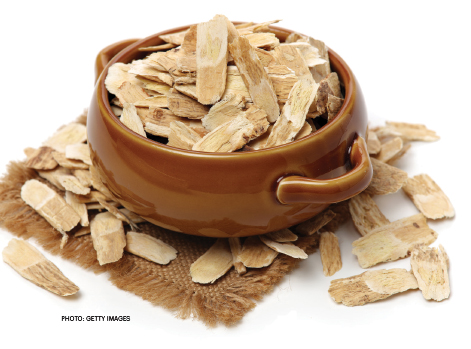
Yen Nien Hou, PharmD, DipIOM, LAc

Jyothirmai Gubili, MS
The ASCO Post’s Integrative Oncology series is intended to facilitate the availability of evidence-based information on integrative and complementary therapies sometimes used by patients with cancer. In this installment, Yen Nien Hou, PharmD, DipIOM, LAc, and Jyothirmai Gubili, MS, focus on the herb astragalus because of its popularity as an immunostimulant.
Scientific Name: Astragalus membranaceus
Common Names: Huang chi, ogi, hwanggi, milk vetch
Overview
Astragalus, a perennial flowering plant prevalent in China, has a long history of use in traditional Chinese medicine. Its root is often combined with other herbs to boost the immune system, improve endurance, prevent upper respiratory infections, lower blood pressure, treat heart disease and diabetes, and as an adjunctive therapy for cancer.
Astragalus is also used in Asian cuisine in the form of medicinal soups and is thought to improve strength and stamina. Dietary supplements are available as tablets, capsules, tinctures, ointments for topical use, and in injectable form for use in clinical settings.
The Science
Astragalus and its constituents demonstrated antioxidant,1 anti-inflammatory,2 antiviral,3 and anticancer4 properties, along with exerting cardioprotective,5 renoprotective,6 osteoprotective,7 as well as neuroprotective effects.8
Systematic reviews suggest that adjunctive use of oral astragalus with conventional therapies may be effective for improving albuminuria, proteinuria, and serum creatinine in patients with diabetic kidney disease (66 studies, n = 47,859)9 and useful in reducing post-stroke fatigue (16 studies, n = 1,222).10
Clinical data on the effectiveness of astragalus in oncology settings are limited. A systematic review (4 trials, n = 342) showed that it helped stimulate immunocompetent lymphocytes and decrease nausea and vomiting in patients with colorectal cancer who were undergoing chemotherapy.11
GUEST EDITOR

Jun J. Mao, MD, MSCE
Integrative Oncology is guest edited by Jun J. Mao, MD, MSCE, Laurance S. Rockefeller Chair in Integrative Medicine and Chief of Integrative Medicine Service at Memorial Sloan Kettering Cancer Center, New York.
A meta-analysis (27 trials, 1,843 patients with colorectal cancer) also found reductions in chemotherapy-induced nausea and vomiting (risk ratio = 0.65 [0.59–0.71], I(2) = 28%) following concurrent use of astragalus with chemotherapy compared with chemotherapy alone. The reductions seemed to be similar with or without the addition of conventional antiemetics.12
A second analysis (45 trials, 3,236 patients with hepatocellular cancers) reported improvements in 12-month survival with products containing ginseng, astragalus, and mylabris (odds ratio = 1.24, 95% confidence interval [CI] = 1.16–1.33, P = < .0001) and with astragalus alone (odds ratio = 1.28, 95% CI = 1.15–1.40, P = < .0001).13
All the previous mentioned reviews and analyses cited limitations. They include small study size, lack of data on long-term effects, poor methodology, as well as risk of bias. Also highlighted in these studies was the need for larger well-designed trials.
Astragalus has also been evaluated in small randomized trials. In a study of 136 patients with advanced non–small cell lung cancer, three cycles of treatment with injectable astragalus polysaccharide (250 mg/d concurrent with chemotherapy cycle) combined with vinorelbine and cisplatin yielded significant improvements in overall quality of life (P = .003) compared with the control group receiving chemotherapy alone.14
Similar improvements in global quality of life were reported in another study of 23 patients with metastatic disease following adjunctive use of both high (500 mg, P = .012) and low (250 mg, P = .02) doses of injectable astragalus polysaccharide, administered 3 times/week/cycle of 4 weeks.15 In addition, 500 mg of injectable astragalus polysaccharide was shown to alleviate cancer-related fatigue (P = .043) in a trial involving 90 patients with advanced cancer.16

Furthermore, a population-based study involving 498 patients with acute myeloid leukemia reported adjunctive use of astragalus and astragalus-based formulas to be associated with prolonged survival (P < .001) compared with nonusers.17
Pharmacologic investigations revealed polysaccharides, triterpenoid saponins, and flavonoids to be the chief bioactive compounds in astragalus. They were shown to have immunomodulating, antioxidant, anti-inflammatory, and anticancer effects.1,4
The immunomodulatory effects of astragalus were found to be exerted through Toll-like receptor 4–mediated activation of mitogen-activated protein kinases and nuclear factor–kappa B.18 In another study, a sublingual astragalus root extract resulted in increases in monocyte, neutrophil, lymphocyte, and platelet counts, as well as circulating cytokine levels, in healthy adults. Symptoms such as fatigue, malaise, and headache similar to a viral type of immune response were also reported.19
Adverse Reactions
Fatigue, malaise, headache, and hypotension have been reported in a study involving healthy adults.19
Herb-Drug Interactions
Immunosuppressants: Because of its immunostimulant effects, astragalus may potentially antagonize the effects of immunosuppressants.
Hormonal Therapies: Astragalus and its constituents were shown to have estrogenic20,21 properties and may interfere with their actions.
Anticoagulants: Astragalus and its constituents showed anticoagulant properties in vitro22 and may increase the risk of bleeding when used with these drugs.
OF NOTE
Astragalus is a popular immunostimulant sought by many patients with cancer. Physicians should be aware of the lack of robust data and of its potential for interactions with some prescription medications including immunosuppressants.
P-glycoprotein Substrates: Astragalus polysaccharides may inhibit the P-glycoprotein efflux pump function. This can increase the cytotoxicity of chemotherapeutic agents, including doxorubicin, etoposide, and vincristine.23
Gemcitabine: In a murine model, pretreatment with an astragalus extract affected the pharmacokinetics of gemcitabine.24
The clinical significance of the interactions mentioned above has yet to be determined.
Diuretics: In a small study of healthy adults, astragalus demonstrated natriuretic effects25 and may have additive effects with these agents.
Antihypertensive Drugs: An astragalus extract lowered both systolic and diastolic blood pressures in a study of healthy adults and may have additive effects with concomitant use.19
Conclusion
Astragalus taken as a raw herb (60–120 g) under the supervision of a licensed practitioner is generally safe for immunomodulation and for improving strength. It is also marketed as a dietary supplement in the form of tablets, capsules, extracts, and tinctures. Although astragalus is considered to be safe, the long-term effects of supplementation have yet to be determined. Patients should consult with their health-care providers about the risks and benefits associated with long-term use of astragalus.
DISCLOSURE: Dr. Hou and Ms. Gubili reported no conflicts of interest.
REFERENCES
1. Shahzad M, Shabbir A, Wojcikowski K, et al: The antioxidant effects of Radix Astragali (Astragalus membranaceus and related species) in protecting tissues from injury and disease. Curr Drug Target 17:1331-1340, 2016.
2. Wang Y, Ren T, Zheng L, et al: Astragalus saponins inhibits lipopolysaccharide-induced inflammation in mouse macrophages. Am J Chin Med 44:579-593, 2016.
3. Wang S, Li J, Huang H, et al: Anti-hepatitis B virus activities of astragaloside IV isolated from radix Astragali. Biol Pharm Bull 32:132-135, 2009.
4. Auyeung KK, Han QB, Ko JK: Astragalus membranaceus: A review of its protection against inflammation and gastrointestinal cancers. Am J Chin Med 44:1-22, 2016.
5. Han R, Tang F, Lu M, et al: Protective effects of Astragalus polysaccharides against endothelial dysfunction in hypertrophic rats induced by isoproterenol. Int Immunopharmacol 38:306-312, 2016.
6. Meng LQ, Tang JW, Wang Y, et al: Astragaloside IV synergizes with ferulic acid to inhibit renal tubulointerstitial fibrosis in rats with obstructive nephropathy. Br J Pharmacol 162:1805-1818, 2011.
7. Cheng X, Wei B, Sun L, et al: Astragaloside I stimulates osteoblast differentiation through the Wnt/beta-catenin signaling pathway. Phytother Res 30:1680-1688, 2016.
8. Dun C, Liu J, Qiu F, et al: Effects of Astragalus polysaccharides on memory impairment in a diabetic rat model. Neuropsychiatr Dis Treat 12:1617-1621, 2016.
9. Zhang L, Shergis JL, Yang L, et al: Astragalus membranaceus (Huang Qi) as adjunctive therapy for diabetic kidney disease: An updated systematic review and meta-analysis. J Ethnopharmacol 239:111921, 2019.
10. Xu L, Xu XY, Hou XQ, et al: Adjuvant therapy with Astragalus membranaceus for post-stroke fatigue: A systematic review. Metab Brain Dis 35:83-93, 2020.
11. Taixiang W, Munro AJ, Guanjian L: Chinese medical herbs for chemotherapy side effects in colorectal cancer patients. Cochrane Database Syst Rev (1):CD004540, 2005.
12. Chen MH, May BH, Zhou IW, et al: Integrative medicine for relief of nausea and vomiting in the treatment of colorectal cancer using oxaliplatin-based chemotherapy: A systematic review and meta-analysis. Phytother Res 30:741-753, 2016.
13. Wu P, Dugoua JJ, Eyawo O, et al: Traditional Chinese medicines in the treatment of hepatocellular cancers. J Exp Clin Cancer Res 28:112, 2009.
14. Guo L, Bai SP, Zhao L, et al: Astragalus polysaccharide injection integrated with vinorelbine and cisplatin for patients with advanced non-small cell lung cancer: Effects on quality of life and survival. Med Oncol 29:1656-1662, 2012.
15. Huang WC, Kuo KT, Bamodu OA, et al: Astragalus polysaccharide (PG2) ameliorates cancer symptom clusters, as well as improves quality of life in patients with metastatic disease, through modulation of the inflammatory cascade. Cancers (Basel) 11:1054, 2019.
16. Chen HW, Lin IH, Chen YJ, et al: A novel infusible botanically-derived drug, PG2, for cancer-related fatigue: A phase II double-blind, randomized placebo-controlled study. Clin Invest Med 35:E1-E11, 2012.
17. Fleischer T, Chang TT, Chiang JH, et al: Improved survival with integration of Chinese herbal medicine Therapy in patients with acute myeloid leukemia: A nationwide population-based cohort study. Integr Cancer Ther 16:156-164, 2017.
18. Wei W, Xiao HT, Bao WR, et al: TLR-4 may mediate signaling pathways of Astragalus polysaccharide RAP induced cytokine expression of RAW264.7 cells. J Ethnopharmacol 179:243-252, 2016.
19. Denzler K, Moore J, Harrington H, et al: Characterization of the physiological response following in vivo administration of Astragalus membranaceus. Evid Based Complement Alternat Med 2016:6861078, 2016.
20. Zhang CZ, Wang SX, Zhang Y, et al: In vitro estrogenic activities of Chinese medicinal plants traditionally used for the management of menopausal symptoms. J Ethnopharmacol 98:295-300, 2005.
21. Chen J, Zhang X, Wang Y, et al: Differential ability of formononetin to stimulate proliferation of endothelial cells and breast cancer cells via a feedback loop involving MicroRNA-375, RASD1, and ERα. Mol Carcinog 57:817-830, 2018.
22. He CL, Yi PF, Fan QJ, et al: Xiang-Qi-Tang and its active components exhibit anti-inflammatory and anticoagulant properties by inhibiting MAPK and NF-kB signaling pathways in LPS-treated rat cardiac microvascular endothelial cells. Immunopharmacol Immunotoxicol 35:215-224, 2013.
23. Tian QE, Li DH, Yan M, et al: Effects of Astragalus polysaccharides on P-glycoprotein efflux pump function and protein expression in H22 hepatoma cells in vitro. BMC Complement Altern Med 12:94, 2012.
24. Chu Z, Wang Z, Liu T, et al: Evaluation of the effects of Astragalus membranaceus on the pharmacokinetics of pemetrexed disodium and gemcitabine in rats by a simple high-performance liquid chromatography/UV method. J Anal Methods Chem 2019:3162426, 2019.
25. Ai P, Yong G, Dingkun G, et al: Aqueous extract of Astragali Radix induces human natriuresis through enhancement of renal response to atrial natriuretic peptide. J Ethnopharmacol 116:413-421, 2008.

